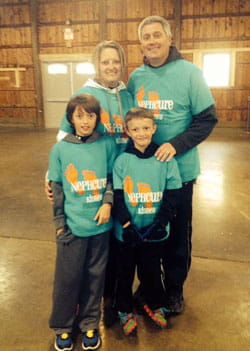“When he was little, Jonathan didn’t know what ‘good’ felt like,” says Candi Snyder, describing her son’s life with nephrotic syndrome, diagnosed at age two and a half. “He didn’t have a clue.”
Jonathan’s journey began one morning when Candi noticed swelling around his eyes. He had other symptoms, too: eczema and asthma. The family pediatrician referred the Snyders to UPMC Children’s Hospital of Pittsburgh for tests, and the diagnosis came back confirming nephrotic syndrome (NS).
“Two years old is a classic age for this syndrome,” says the clinical director of Pediatric Nephrology at UPMC Children’s Hospital. “It can happen at any age, but this form typically shows up between ages two and eight. And it is a major life event — for the child and the whole family.”
Undefined causes
Nephrotic syndrome is a serious condition whose causes are still largely undefined. Its sufferers lose massive amounts of protein through their urine. Untreated, it can lead to life-threatening infection, dangerous blood clots, crippling swelling of the body and potentially kidney failure. Typically, patients like Jonathan are prescribed steroids to alleviate the protein loss and other symptoms of the syndrome. If steroids do not work, a kidney biopsy and other immunosuppressants are required.
Art, science and teamwork
The elusive nature of nephrotic syndrome makes finding the right mix of medications a challenge.
“This is a condition that requires both art and science on the part of the doctor,” says Jonathan's doctor. Because immunosuppressants have side effects that can be serious, the best treatment is one that involves the minimum amount of precisely the right medication for each patient’s unique case.
Researchers at UPMC Children’s and elsewhere are testing new ways to predict the right medication mix and dosage. But for now, it’s matter of prescribe, monitor, and adjust. Finding the right combination takes full-out collaboration among medical staff, patient and caregivers.
“The family has to take an active role,” says Jonathan's doctor. “They do a lot of monitoring at home, because you need to pick up signs of a relapse early. A cold, sore throat, or sinus infection could trigger a relapse. If you catch the relapse early, you can get the disease to go into remission early.”
Initial success … then setback
Jonathan’s first steroid treatment went well for a while.
“We were fortunate,” says Joe Snyder, Jonathan’s dad. “He responded quickly to the steroids. We thought it wasn’t going to be a big deal.” But three months later, Jonathan suffered a relapse.
Rather than risk the side effects of long-term steroid therapy, the team decided to change to advanced immunosuppressants; the kind used for organ transplant cases. Close collaboration and monitoring of Jonathan’s symptoms over the course of the last few years on these drugs have resulted in a medication regimen that has made his life symptom-free.
“It’s meant lots of trips from our home in West Virginia to Pittsburgh for blood work and doctor visits,” says Joe. “But it’s been worth it. We could get a routine blood test closer to home, but we trust Children’s. We know they’re going to take the best care of Jonathan.”
Life with immunosuppression
 Besides symptoms and side effects, one of the biggest challenges for a family dealing with nephrotic syndrome is imposed by the child’s suppressed immune system. Jonathan had to withdraw from preschool for fear of catching an otherwise innocent childhood malady that would trigger a relapse of his NS. The family had to plan vacations carefully so as to minimize contact with crowds and germs. Some of the usual school-age vaccines were off limits if they contained a live virus.
Besides symptoms and side effects, one of the biggest challenges for a family dealing with nephrotic syndrome is imposed by the child’s suppressed immune system. Jonathan had to withdraw from preschool for fear of catching an otherwise innocent childhood malady that would trigger a relapse of his NS. The family had to plan vacations carefully so as to minimize contact with crowds and germs. Some of the usual school-age vaccines were off limits if they contained a live virus.
And day-to-day care could be a challenge too. One treatment for Jonathan’s eczema involved wet pajamas to ease his skin irritation.
“Let me tell you,” recalls Candi, “you try to put wet pajamas on a four-year-old several times a day: it’s not fun.”
Staying on top of it
Today, Jonathan is doing well. He’s taking one pill a day for his nephrotic syndrome, along with medications that control asthma and allergies to prevent a potential relapse. He has no symptoms of nephrotic syndrome or complications.
”After having a really bumpy road, and working together with the family to find the right medication, he’s growing, thriving, and leading a regular life,” says Jonathan's doctor.
With treatment, Jonathan has been able to do more than just keep up in school, achieving straight A’s “every year,” he says. He plays soccer with the Hammerheads, a local community team.
“I have a nickname,” Jonathan says. “Speedy. It’s because I’m so fast.”
“Things feel more normal,” says Joseph. “But Candi and I are very conscious of anything that could cause a relapse … sniffles, a cough, anything at all.” Candi agrees. “It’s great compared to where we started,” she says, “but you have to stay on top of it.”
Asked how he feels today, after a long and difficult journey, Jonathan offers the best possible answer: “Good!”
He knows what that feels like now.









